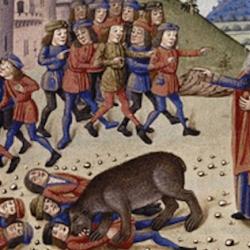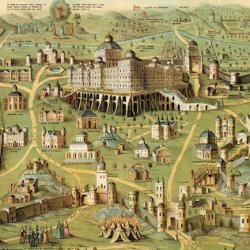Glory Beyond the Kings of the Earth, 1 Kings 4-5
INTRODUCTION
In 1 Kings 3, Solomon asked for and was given wisdom, and Yahweh also promised to give him glory and riches and a long life. In the following chapters, we see these promises fulfilled. Solomon demonstrates his wisdom by organizing the kingdom, in his relations with Hiram king of Tyre, and in building the temple (cf. Exodus 31:3). All these displays of wisdom bring him glory beyond the glory of any kings of his time.
THE TEXT
“So King Solomon was king over all Israel. And these were his officials: Azariah the son of Zadok, the priest; Elihoreph and Ahijah, the sons of Shisha, scribes; Jehoshaphat the son of Ahilud, the recorder . . . .” (1 Kings 4:1-5:18).
NEW JOSHUA
Early in 1 Kings, David addresses Solomon as Moses addressed Joshua. The “Solomon-as-Joshua” theme continues in the following chapters. Joshua sent spies into the land, who stayed with the prostitute Rahab; and Solomon passes judgment in the case of the two prostitutes. Then Joshua leads Israel in the conquest of Jericho and Ai; Solomon, for his part, rules the kings west of the Euphrates river (4:21). The Gentile Gibeonites trick Joshua into forming an alliance with them, and in 1 Kings 5 Hiram of Tyre, a Gentile ruler, forms an alliance with Solomon. Solomon tells Hiram that the land is at “rest” (5:4), a condition that Joshua achieved by defeating Canaanites in the north and south (Joshua 11:23). At the climax of Joshua, he sets up the tabernacle at Shiloh (Joshua 18:1ff), and the high point of Solomon’s reign came with the building of the temple (1 Kings 6-7).
Joshua led Israel into a land flowing with milk and honey, a land with abundant food. And this too is fulfilled in Solomon’s reign. The structure of 1 Kings 4 centers on the rich provision of Solomon’s table:
a. Solomon’s officials and deputies, vv 1-19
b. Judah and Israel eat drink and rejoice, v 20
c. Solomon rules over the kingdoms from the river to Egypt, v 21
d. Provisions of Solomon’s table, vv 22-23
c’. Solomon rules over everything west of the River, v 24
b’. Judah and Israel are living in safety, v 25
a’. Deputies provide for his household, v 26-28
KINGDOM OF JOY
The picture of Israel’s life under Solomon in 1 Kings 4 is a picture of perfect peace, harmony, safety, and joy. This fulfills promises originally given centuries before to Abraham. Israel has finally become as numerous as the sand on the seashore (v. 20; cf. Genesis 22:17). Between Abraham and Solomon, this description has been applied only to Israel’s enemies, false Israels (Joshua 11:4; Judges 7:12; 1 Samuel 13:5; 2 Samuel 17:11). Now, finally, Israel becomes what Yahweh promised. The phrase “like sand on the seashore” is repeated in verse 29 where it describes Solomon’s breadth of “heart”. He has a “hearing heart” (3:9), a heart of wisdom broad enough to rule a numerous people that cannot be counted.
According to verse 21, another Abrahamic promise is being fulfilled. In Genesis 15:18, Yahweh tells Abraham the dimensions of the land that is promised to Israel. In 1 Kings 4:21, that promise is fulfilled. Solomon’s kingdom stretches between the waters of the Mediterranean and the waters of the Euphrates, and stretches north to Dan and south to Beersheba (v. 25). Israel has stretched out to the four corners of the earth, the four points of the compass. Moreover, the kings who rule in the territory of Solomon become tributary states, bring their tribute and service to Solomon (4:21). Israel has become the head and not the tail (Deuteronomy 28:13).
At the center of the passage, the narrator emphasizes that Solomon’s kingdom is one of joy and abundance. Each Israelite has his own Eden ?Ea garden with a vine and a fig tree (v. 25). Solomon’s table surpasses all the others. Like a new a better Adam, Solomon not only subdues the surrounding kingdoms, but takes the whole world as his food. This connection between rule and food is underscored by the fact that Solomon’s table is laden not only with domestic animals (oxen, sheep) that represent Israel, but with wild animals (deer, gazelles, roebucks) that represent Gentiles (v. 23).
Verse 26 strikes a sour note. The writer slips in a note that shows that Solomon’s wealth is being used in ways that are not approved by Yahweh. In the midst of this abundance, Solomon is multiplying horses and chariots, in violation of the laws of kingship from Deuteronomy 17.
SOLOMON AND HIRAM
1 Kings 4:29 begins a new section, which is also organized as a chiasm:
a. Solomon’s wisdom, 4:29-34
b. Hiram sends servants to Solomon, 5:1
c. Solomon’s message to Hiram, 5:2-6
b’. Hiram’s response to Solomon, 5:7-11
a’. Solomon’s wisdom, 5:12
The section begins with a sevenfold description of the wisdom of Solomon (vv. 29-31). The wisdom of Egypt was legendary in the ancient world, but Solomon surpasses them as well (v. 30). He is far and away the wisest man in Israel (the four men listed in v. 31 are apparently from the tribes of Judah, cf. 1 Chronicles 2:5, 9ff). His wisdom is demonstrated in songs and proverbs, and in observations of the natural world. Solomon’s wisdom is Adamic, since he is wiser than all adam (“men”; v. 33), and since he speaks of animals and plants. From Ecclesiastes 2:5, we know that Solomon made a garden, an advance beyond the first Adam.
Hiram is introduced as one of the kings who sought out Solomon’s wisdom (4:34-5:1; no chapter break in the original). Hiram fits into a common pattern in the OT: At each new phase of the covenant, there is a Gentile who assists Israel in some fashion: Melchizedek, Jethro (Moses’ father-in-law), Naaman the Syrian, Cyrus the Persian. Tyre represents something new, however. From this point on, Tyre becomes a fixture in Israel’s history, and is frequently mentioned in the prophetic books (e.g., Ezekiel 28).
Solomon and Hiram arrange a wood-for-food program (distant precursor to contemporary oil-for-food programs). Solomon is a new Joseph, feeding the world. As implied by the Abrahamic promise, the food on Solomon’s table is not gathered only to fatten him and his house. The Gentiles eat the crumbs that fall from his table. Christ the greater Solomon has set up a table in the center of the world, one that is so abundant that it feeds the world.
Catechism for Little Saints
How did Solomon show his wisdom?
By ruling his kingdom well, by writing songs and proverbs, and by making wise alliances with Gentiles.
How does Israel live during Solomon’s reign?
Israel is peaceful, secure, and joyful, and everyone has plenty of food.
For Further Study
Use a concordance to look up the names Heman and Ethan the Ezrahite. How did they show their wisdom?















